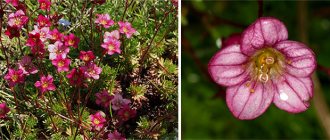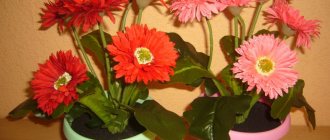Garden azalea is a flower that, during flowering, becomes the king of any plot and flower bed, strikingly different from other plants. Looking at such beauty, one gets the impression that growing it will cost the gardener a lot of time and effort, but this is not entirely true. The plant is quite unpretentious.
The name azalea is translated from Greek as “rose tree”
Varieties
Of the many outdoor bush azaleas, two of their varieties are the most popular due to their high decorative qualities - large-flowered and Japanese.
The preferred variety for planting in open ground is Japanese azalea. This is a frost-resistant species that can tolerate frosts down to -30 °C.
The height of the bushes varies from 30 to 100 cm. The main colors of the petals are lilac, pink, purple, presented in different shades.
Popular varieties:
- Rosinetta;
- Marushka;
- George Arendez;
- Kermezina.
Japanese varieties can be either deciduous or evergreen.
Experienced gardeners often decorate Japanese azaleas in the form of bonsai, it looks simply incredible
Varieties of frost-resistant large-leaved garden azalea:
- Chanel;
- Sonya;
- Tunisia;
- Freya;
- Starus;
- Klondike.
Large-leaved varieties are deciduous. The main colors of the petals are represented by all shades of golden and orange.
Azalea is a long-blooming shrub. Depending on the variety, the duration of the process varies from 3 weeks to several months.
What is the lifespan and can it be extended?
The flower can grow for 5-6 years. In order to extend the flowering period of a plant, the gardener must comply with conditions that rely on natural adaptations.
The lifespan depends on how the azalea goes through the seasons. She needs a period of rest and should sometimes be taken out into the cold. Azalea loves bright light, but does not tolerate sun very well. It should be kept in a bright, cool room. This could be a winter garden, a frost-free balcony or a greenhouse. If you follow these recommendations, you can extend its flowering period.
Suitable place for landing, disembarkation
To successfully grow an azalea in the garden, you need to choose the right place for it. The site must meet the following requirements:
- absence of direct sunlight, lighting should be diffused;
- the predominant side is the northern one, which is illuminated by the sun in the first half of the day, and partial shade begins in the afternoon;
- absence of strong wind and protection from drafts;
- There is no stagnation of liquid after watering or rainfall.
When choosing a location, you have to pay attention to neighboring plants. They should not have a shallow root system, which absorbs all the moisture.
It is not recommended to plant hybrid azalea near maple, linden, alder or poplar.
An azalea bush will feel comfortable near natural or artificial reservoirs, near which the air is always humid
Planting azaleas, description of the process:
- Holes are prepared about 40 cm deep and 60 to 80 cm wide.
- Drainage is placed at the bottom of the hole, the layer thickness is about 15-20 cm. Pieces of brick or expanded clay mixed with sand can be used as drainage.
- The hole is well shed with water.
- The bush is taken out of the temporary container; soil should remain on the roots.
- The azalea is placed in the center of the hole, while the earthen lump on the bush should coincide with the edges of the hole.
- The voids are filled with soil, which is slightly compacted.
The plant should not be placed on limestone soils or loams. If necessary, the top layer of soil must be replaced.
To replace unsuitable soil, specialized purchased soils intended for this type of plant, or a self-made mixture of ingredients taken in equal parts - peat, sand, coniferous soil and acidic turf - are suitable.
Kinds
Nowadays there are many different domestic varieties, which originated from two main species.
- Indian azalea, Sims rhododendron or as it is also called Simsi azalea (Latin name Rhododendron simsii)
The shoots of this species are covered with small bristles. The flowers are funnel-shaped and their circumference does not exceed 3.5 cm. The colors of the inflorescences can consist of two shades or be decorated with small specks.
- Japanese azalea or obtuse rhododendron (Latin name Rhododedron obtusum)
This type of plant has shiny leaves and funnel-shaped flowers with a diameter of no more than 3 cm. It has the status of the national flower of Japan, not falling behind sakura in its popularity. Quite often used in Japanese compositional gardens.
The most popular varieties of indoor rhododendron
- Albert Elizabeth, a double flower with large buds having white or slightly pink petals with a bright edging around the edge.
- Eri - seems to be an early variety. Indoor representatives have not very double, but rather large flowers. The flower petals are of the most delicate pink tone along the edges, and with prominent white spots that have a slightly irregular shape.
- Paul Sheme is a medium early or early variety. The indoor representative has flowers of a piercing salmon color, of average size. Corrugated petals edged with a white stripe.
- Madame Jean Peters - the plant has a rich pink tint in double flowers. The pink tone becomes deeper towards the wavy edge.
- Adventsglopen is a tall plant, but suitable for growing indoors with beautiful dark emerald lance-shaped, leathery leaves. The flowers are bell-shaped, non-double, dark pink with a slightly crimson splash.
- Verveniana mitterfuch is a mid-early variety. Azaleas with giant inflorescences, sometimes semi-double and sometimes double. The petals have an uneven pink coating. The core has crimson and white specks.
- Flamenco variety of indoor azalea with extravagant lilac inflorescences.
- Concinna is a mid-early variety, the pet will be spreading and tall. The existing leaves are small in size, not bright, slightly dim (reddish hairs protrude on the upper and lower areas of the leaf blade). Young leaves are silvery. The inflorescences are open and round in shape, non-double, lilac or pale lilac in color.
- Snowflake, its name warns of its color - these are snow-white abundant inflorescences that almost completely cover the plant.
- Niobe is a late-flowering variety. The specimen is tall with miniature, hairless, far-spreading emerald leaves. White double flowers with an intriguing greenish tint.
- Celestina is a late flowering subspecies. This azalea is rather not compact, with branches spreading in different directions, and can be either short or medium-sized. The leaves are small and covered with fluff, dark and dense green in color. Unusual rich carmine multiple buds.
Rules of agricultural technology
Planting and caring for deciduous azaleas in the open ground cannot be called difficult, although there are some peculiarities of agricultural technology.
Watering
Watering the bush should be regular. It is carried out as the top layer of soil dries out.
Only settled or ground water is used. Water for irrigation should be at room temperature.
With the beginning of August, watering is gradually reduced so that the plant can gradually stop its growth before winter.
Collected rainwater can be used for irrigation
Fertilizers
Timely application of the right fertilizers will help maintain abundant flowering:
- early spring - mullein is used;
- before flowering - nutritional compositions with potassium;
- second half of July - fertilizers with a predominance of phosphorus.
You should not overfeed azalea.
Fertilizers with nitrogen are applied only in early spring. In the future, this element should not exist, since it provokes the rapid development of the green part, which is why the plant does not have the strength to form buds.
Insect pests and diseases
Diseases to which azalea is susceptible:
- rust;
- root rot;
- fungal infections;
- various spots.
Fungicides are used to treat the plant.
Insect pests - aphids, whiteflies, spider mites, thrips. To eliminate pests, bushes are treated with insecticides.
Each time after flowering, it is necessary to remove dried buds to activate the re-formation of flowers.
Trimming Features
Pruning is not a mandatory agrotechnical measure, since the bush itself forms a correct, beautiful crown.
Pruning is carried out in early spring for sanitary purposes. What needs to be removed:
- weak growth or with traces of diseases;
- frozen branches;
- damaged shoots.
The cut areas must be treated with garden decoction.
To rejuvenate the bush, in the spring half of the branches are cut to a height of 40-50 cm. The remaining half of the branches are cut off the next season.
Features of care
Lighting in an ordinary apartment should be diffused; light partial shade from northern or western window sills is allowed. In order for the plant to grow and develop normally, the room temperature must be maintained at 15-18 degrees Celsius. Azaleas need to be watered very often and abundantly. This must be done every day.
The frequency of watering depends on the level of air humidity. It is recommended to place pieces of ice on the surface of the soil, which will melt and thus saturate the substrate with moisture, as well as refresh the flower on summer days.
Periodically, it is necessary to dissolve a teaspoon of lemon juice in 2 liters of water, and then water the plant with this mixture. With the arrival of autumn, you should water the plant less often. When the flowering period begins again, it should again be frequent and abundant.
Azalea needs high air humidity . The plant should be sprayed. It can also be placed on a tray with wet pebbles.
As for feeding, in summer and spring it is carried out once a week. With the onset of winter cold, the plant needs to be fertilized once a month. As a top dressing, you should use a special mineral complex for Azalea. Any other compositions that are intended for flowering plants and do not contain chlorine are also suitable.
When the active growth of the plant begins, the gardener needs to shorten the shoots that have grown strongly. During the growing season, you need to pinch the tops, so that the azalea will not bush too much, and the flowering will be abundant. Transplantation is carried out only when the plant becomes cramped in the pot.
After flowering, the plant begins a dormant period that lasts 2 months.
We invite you to watch a video about the features of caring for azaleas:
Reproduction methods
The optimal propagation method is cuttings. Time: summer.
Cuttings are carried out as follows:
- Shoots 10-15 cm long, with several leaves on each, are cut from the mother bush;
- the cut of the cutting is made strictly at an oblique angle;
- the cutting is placed in a growth stimulator;
- the shoot is placed in nutrient soil in a peat glass;
- after planting, the cuttings are sprayed from a spray bottle, the container is covered with film;
- For the first time, you can remove the covering after 1 week to ventilate the cuttings for a few minutes;
- In the future, ventilation should be regular.
Rooting of the cutting occurs in approximately 1.5 - 2 months.
You can tell that a cutting has taken root by its increased size. Then you can move it to a permanent place in the garden, lowering it into the ground directly in a peat glass.
Another method of propagation is layering. The lower branch is lowered to the ground into a prepared ditch about 10 cm deep and secured with staples. The tip of the shoot should remain in a vertical direction.
It is necessary to care for it in the same way as for the mother bush. Next year, cuttings are cut, each should have a root bud - they can be immediately planted in open ground.
The seed method of growing azaleas at home is not used due to its labor intensity and low germination rate of the seed.
How to replant a garden azalea
Sometimes gardeners have a desire to replant their beauty, but before performing this procedure it is worth considering when it is possible to replant a garden azalea.
It is best to do this in the spring, before the sap begins to flow, so as not to disturb anything and the rhododendron does not change its mind about blooming. If for some reason you were unable to replant in the spring, then you can do it in early autumn. However, the plant should already bloom, but not immediately before the cold weather, since in this case the plant simply will not have time to take root and will disappear.
The choice of location, soil preparation and the planting process itself are carried out in the same order as when planting an azalea in the ground for the first time.
Preparing the plant for wintering
Despite the fact that azalea is a winter-hardy plant, one of the requirements for its normal overwintering and lush flowering next season is proper shelter before cold weather.
Features of preparation for wintering:
- From the second half of summer, watering is gradually reduced.
- From July the use of fertilizers stops.
- In the autumn, while the earth has not yet cooled, abundant watering is carried out.
- The root system is wrapped in mulch, for young bushes the layer is 10 cm, for adult specimens - up to 30 cm.
- Deciduous varieties - the branches bend to the ground, are fixed with staples, and covered with spruce branches.
- Evergreen varieties require careful covering with the organization of a frame, onto which agrofibre or other insulating material is stretched in several layers.
The opening of azaleas in the spring occurs only after the snow has completely melted and there is a stable above-zero temperature.
After wintering, the shelter must be removed gradually, and only on a cloudy day.
The canvas is first removed for several hours, then the daylight hours gradually increase. This is done so that the shoots do not get burned from the sun's rays.
Azalea in the garden
How to prune an azalea in the garden
Many gardeners do not know how to prune an azalea after flowering, and that pruning should take place in three stages. Each of them depends on the time of year.
The first pruning of rhododendron should be done in the spring. Removing all diseased and dry shoots. We leave the rest; flower buds have been on them since the fall.
The second pruning is carried out directly during the flowering period. All faded flowers must be removed, as they slow down the growth of the plant and prevent the appearance of new buds. By not cutting off faded flower stalks in time, you shorten the flowering period of the azalea.
After the last flowers have faded, final pruning is necessary. To do this, we remove all wilted and dried flower stalks, and shorten shoots that are too long. If the bush is too thick, then it should be lightened a little by cutting out the branches.
All other shoots are shortened by no more than 1/3 of the length. All this will help make your plant even more magnificent next year and flowering will be more abundant.
The pruning areas, regardless of the type carried out, must be lubricated with garden varnish.
Expert opinion
Oksana Alexandrovna
A gardener with extensive experience. Vegetable gardening is more than just a hobby for me.
The sap of the plant is poisonous! To avoid irritation, pruning should be done with gloves.
Botanical description
Azalea (Rhododendron Sims, Azalea) is a shrubby evergreen plant. Indoor species and varieties grow up to half a meter in height. Shrubs growing in gardens can reach 1.5 m.
The plant is highly branched. Oval or lanceolate-shaped leaves grow densely on the shoots. The leaf blades are dense, dark green in color with a noticeable central vein. The bottom may be covered with hairs or thick fluff.
The plant blooms in winter. Although some varieties can bloom as early as November or, conversely, in the spring, in March-April.
Flowering is lush and spectacular, lasting 30 – 50 days. The flowers grow large and are arranged in small groups of several pieces. The color of the flowers varies and can be white, red, purple or even two-tone.
Indoor varieties of the plant begin to bloom mainly in the 3-4th year of cultivation. Therefore, do not despair if your pet does not flourish in the first year after purchase.











